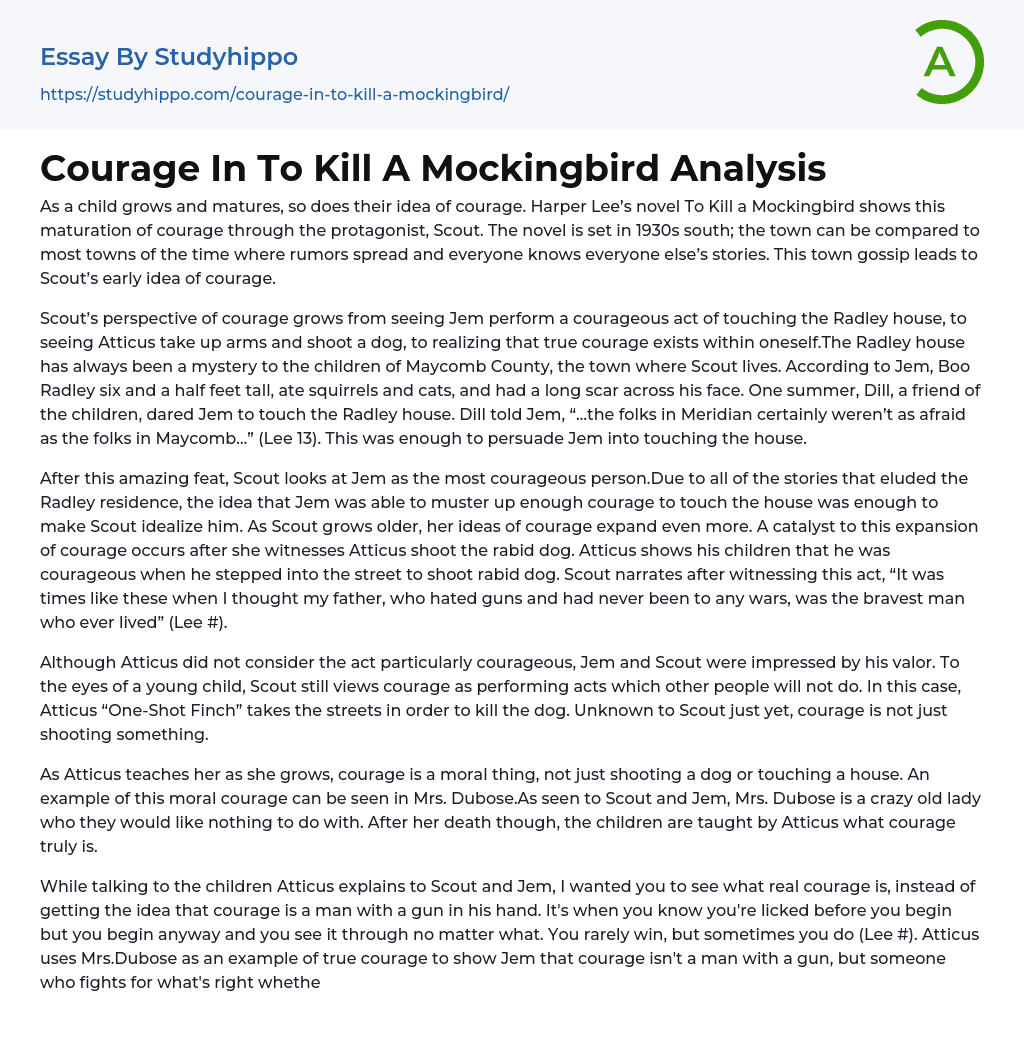As a child grows and matures, so does their idea of courage. Harper Lee’s novel To Kill a Mockingbird shows this maturation of courage through the protagonist, Scout. The novel is set in 1930s south; the town can be compared to most towns of the time where rumors spread and everyone knows everyone else’s stories. This town gossip leads to Scout’s early idea of courage.
Scout’s perspective of courage grows from seeing Jem perform a courageous act of touching the Radley house, to seeing Atticus take up arms and shoot a dog, to realizing that true courage exists within oneself.The Radley house has always been a mystery to the children of Maycomb County, the town where Scout lives. According to Jem, Boo Radley six and a half feet tall, ate squirrels and cats, and had a long scar
...across his face. One summer, Dill, a friend of the children, dared Jem to touch the Radley house. Dill told Jem, “…the folks in Meridian certainly weren’t as afraid as the folks in Maycomb…” (Lee 13). This was enough to persuade Jem into touching the house.
After this amazing feat, Scout looks at Jem as the most courageous person.Due to all of the stories that eluded the Radley residence, the idea that Jem was able to muster up enough courage to touch the house was enough to make Scout idealize him. As Scout grows older, her ideas of courage expand even more. A catalyst to this expansion of courage occurs after she witnesses Atticus shoot the rabid dog. Atticus shows his children that he was courageous when he stepped into the street to shoot rabid dog. Scout narrates after
witnessing this act, “It was times like these when I thought my father, who hated guns and had never been to any wars, was the bravest man who ever lived” (Lee #).
Although Atticus did not consider the act particularly courageous, Jem and Scout were impressed by his valor. To the eyes of a young child, Scout still views courage as performing acts which other people will not do. In this case, Atticus “One-Shot Finch” takes the streets in order to kill the dog. Unknown to Scout just yet, courage is not just shooting something.
As Atticus teaches her as she grows, courage is a moral thing, not just shooting a dog or touching a house. An example of this moral courage can be seen in Mrs. Dubose.As seen to Scout and Jem, Mrs. Dubose is a crazy old lady who they would like nothing to do with. After her death though, the children are taught by Atticus what courage truly is.
While talking to the children Atticus explains to Scout and Jem, I wanted you to see what real courage is, instead of getting the idea that courage is a man with a gun in his hand. It's when you know you're licked before you begin but you begin anyway and you see it through no matter what. You rarely win, but sometimes you do (Lee #). Atticus uses Mrs.Dubose as an example of true courage to show Jem that courage isn't a man with a gun, but someone who fights for what's right whether he or she wins or not.
From here on, Scout’s idea of courage is able to mature into seeing what courage truly is.
In conclusion, the perception of courage changes overtime. Scout was able to adapt to this change and by the end of the novel, knew what true courage is. She would not have been able to have this maturation of courage had it not been for Atticus. Atticus was able to help Scout find what courage truly is
- Book Summary essays
- Metaphor essays
- Reader essays
- Rhyme essays
- Literary devices essays
- Villain essays
- Books essays
- Genre essays
- Literary Criticism essays
- Writer essays
- Protagonist essays
- Simile essays
- Poem essays
- Book Report essays
- Book Review essays
- Greek Mythology essays
- Plot essays
- Tragic Hero essays
- Coming of Age essays
- Play essays
- Rhetoric essays
- Rhetorical Question essays
- Translation essays
- Understanding essays
- Reason essays
- Character essays
- Letter essays
- American Literature essays
- Literature Review essays
- Utopia essays
- Poetry Analysis essays
- Dante's Inferno essays
- Between The World and Me essays
- Incidents in The Life of a Slave Girl essays
- Flowers for Algernon essays
- Myth essays
- Everyday Use essays
- Boo Radley essays
- Genesis essays
- Richard iii essays
- Alice in Wonderland essays
- On the road essays
- Ozymandias essays
- The Nightingale essays
- Holden Caulfield essays
- Animal Farm essays
- 1984 essays
- A Hanging essays
- Shooting An Elephant essays
- A Tale Of Two Cities essays




